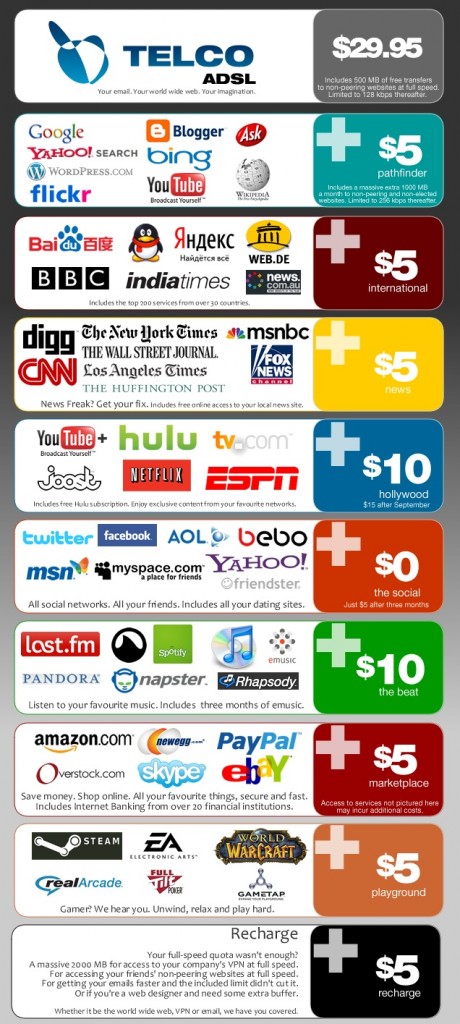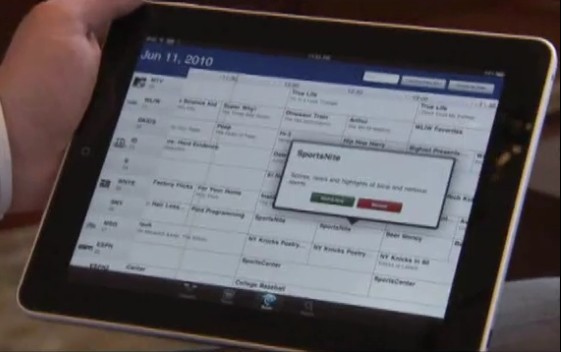
Reardon is fine with this vision of your online future.
Marguerite Reardon confesses she’s confused. She doesn’t understand what all the fuss is about regarding Google and Verizon teaming up to deliver a blueprint for a corporate compromise on Net Neutrality. In a column published today, Reardon is convinced she’s on a debunking mission — to deliver the message that rumors of the Internet apocalypse are premature.
As I read the criticism of Google and Verizon’s supposed evil plan to demolish the Internet, and as I hear about “protests” of several dozen people at Google’s headquarters, I scratch my head and wonder: am I missing something?
The Google-Verizon Net neutrality proposal I read last week doesn’t sound nearly as apocalyptic as Free Press, a media advocacy group, and some of the most vocal critics out there have made it sound.
In fact, most of proposal sounded a lot like a plan FCC Chairman Julius Genachowski offered nearly a year ago, which many Net neutrality proponents seemed to support.
In short, Google and Verizon say they agree to a set of rules for the Internet that would prohibit broadband providers from blocking or degrading lawful content on the Internet. Broadband providers would also not be allowed to take action to impede competition.
This is pretty much what Genachowski has proposed.
OK, terrific. There is agreement.
But wait, Net neutrality zealots are still unhappy.
Hmmm… “zealots?” Reardon probably just angered the majority of CNET’s readers, who now find themselves labeled as crazed Internet online freedom fighters — net fundamentalists who want absolute protection against big Internet Service Providers tampering with their Internet Experience.
Where can I get my membership card?
Reardon’s “debunk” consists of her narrow, inaccurate definition of Net Neutrality pounded into a pre-conceived notion of what is and is not possible in a competitive broadband marketplace. In short, she’s satisfied we can all move along… there is nothing to see here:
What Free Press and Public Knowledge don’t seem to realize is that AT&T and Verizon already offer differentiated services today with enhanced quality of service to business customers. Verizon’s Fios TV and AT&T’s U-verse TV services are also examples of managed Internet services that are delivered to consumers. And the last time I checked, no one, other than their cable competitors, has complained about AT&T and Verizon offering competition in the TV market.
The truth is that if Verizon and AT&T wanted to cannibalize their broadband business with premium broadband services, they’d already be doing it. But they aren’t, because there hasn’t been a market for it.
The reality is that consumers are in control of what type of services are offered. If the public Internet can adequately deliver a service for free, then there’s no need to pay for it. But if someone can provide a better service over a dedicated network and there are consumers willing to pay for it, then why shouldn’t it be offered? Isn’t that why some people subscribe to a 768Kbps broadband service for $15 a month, and others pay $100 for a 50Mbps service?
So let’s debunk the debunk.
First, Net Neutrality is not about stopping broadband providers from offering speed-based tiers of service. In fact, that’s the Internet pricing model we’ve all come to know and love (although those prices are just a tad high, aren’t they?) Free Press and Public Knowledge do not object to ISPs selling different levels of broadband speed tiers to consumers and businesses to access online content.
Net Neutrality isn’t about stopping ISPs from selling some customers “lite” service and others “mega-super-zippy Turbo” service — it’s about stopping plans from some ISPs to establish their own toll booths on the Internet to charge content producers twice — once to upload and distribute their content and then a second time to ensure that content reaches a particular ISPs customers on a timely, non-speed-throttled basis. Consider this: you already pay good money for your own broadband account. How would you feel if you sent an e-mail to a friend who uses another ISP and that provider wanted to charge you 20 cents to deliver that e-mail? Don’t want to pay? That’s fine, but your e-mail might be delayed, as paying customers enjoy priority over your freebie e-mail.
A lot of broadband customers may never understand the implications of giant telecom companies building their own toll lanes for “preferred content partners” on the Internet because they’ll just assume that stuck online video or constantly rebuffering stream is the fault of the website delivering it, not their provider intentionally pushing it aside to make room for content from companies who paid protection money to make sure their videos played splendidly.
Second, Reardon need only look to our neighbors in the north to see a non Net Neutral Internet experience in Canada. There, ISPs intentionally throttle broadband applications they don’t want users running on their networks. They also spank customers who dare to try what Reardon insists Verizon would never stop — using their broadband service to watch someone else’s content. With the application of Internet Overcharging like usage limits and consumption billing schemes, cable companies like Rogers don’t need to directly block competitors like Netflix. They need only spike customers’ broadband bills to teach them a lesson they’ll not soon forget.
Within days of Netflix announcing their imminent arrival in Canada, Rogers actually reduced the usage allowances of some of their broadband customers. If you still want to watch Netflix instead of visiting Rogers pay-per-view cable menu or video rental stores, it will cost you plenty — up to $5 per gigabyte of viewing.
Reardon seems to think giant providers like AT&T, Verizon, and Comcast care about what their customers want and wouldn’t jeopardize the customer relationship. Really? She herself admits she hates paying for hundreds of channels she never watches, yet providers are deaf to complaints from customers demanding an end to this practice. What about the relentless price hikes? Wouldn’t that drive off customers? Perhaps… if customers had real alternatives. Instead, with an effective duopoly market in place, subscribers pay “the man,” pay an almost identical price from the “other guy,” or go without.
Providers understand their power and leverage in the marketplace. Until serious competition arrives, it would be a disservice to stockholders not to monetize every possible aspect of broadband service in the United States.
The check against this naked aggression on consumers’ wallets is from consumer groups who are fighting against these big telecom interests.
Before dismissing Net Neutrality “zealotry,” Reardon should experience the Internet in Canada and then get back to us, and more importantly those consumer groups she flicks away with disdain, and join the fight.
![]() It is all part of an effort by the cable industry to stop cable customers from canceling their cable-TV subscriptions. An increasing amount of online content produced by cable networks is expected to eventually be placed behind the TV Everywhere system. Existing cable subscribers will get access to streamed live channels and on demand programming for free, but non-subscribers will be locked out. Cable networks can decide how much of their programming will be a part of the project, but cable industry insiders predict there will be increasing pressure on them to keep most of their shows off the open Internet.
It is all part of an effort by the cable industry to stop cable customers from canceling their cable-TV subscriptions. An increasing amount of online content produced by cable networks is expected to eventually be placed behind the TV Everywhere system. Existing cable subscribers will get access to streamed live channels and on demand programming for free, but non-subscribers will be locked out. Cable networks can decide how much of their programming will be a part of the project, but cable industry insiders predict there will be increasing pressure on them to keep most of their shows off the open Internet.

 Subscribe
Subscribe






